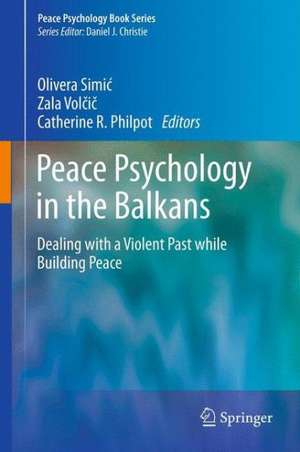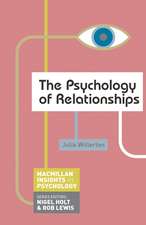Peace Psychology in the Balkans: Dealing with a Violent Past while Building Peace: Peace Psychology Book Series
Editat de Olivera Simić, Zala Volčič, Catherine R. Philpoten Limba Engleză Paperback – 13 apr 2014
| Toate formatele și edițiile | Preț | Express |
|---|---|---|
| Paperback (1) | 638.89 lei 6-8 săpt. | |
| Springer – 13 apr 2014 | 638.89 lei 6-8 săpt. | |
| Hardback (1) | 645.14 lei 6-8 săpt. | |
| Springer – 7 mar 2012 | 645.14 lei 6-8 săpt. |
Din seria Peace Psychology Book Series
- 18%
 Preț: 779.26 lei
Preț: 779.26 lei -
 Preț: 361.07 lei
Preț: 361.07 lei - 15%
 Preț: 639.25 lei
Preț: 639.25 lei - 18%
 Preț: 788.54 lei
Preț: 788.54 lei - 15%
 Preț: 699.28 lei
Preț: 699.28 lei - 15%
 Preț: 646.62 lei
Preț: 646.62 lei - 18%
 Preț: 1690.13 lei
Preț: 1690.13 lei - 15%
 Preț: 645.28 lei
Preț: 645.28 lei - 24%
 Preț: 1044.87 lei
Preț: 1044.87 lei - 18%
 Preț: 945.14 lei
Preț: 945.14 lei - 15%
 Preț: 649.54 lei
Preț: 649.54 lei -
 Preț: 386.39 lei
Preț: 386.39 lei - 15%
 Preț: 697.82 lei
Preț: 697.82 lei - 15%
 Preț: 591.14 lei
Preț: 591.14 lei - 18%
 Preț: 1222.94 lei
Preț: 1222.94 lei - 15%
 Preț: 644.82 lei
Preț: 644.82 lei - 15%
 Preț: 649.22 lei
Preț: 649.22 lei - 15%
 Preț: 697.65 lei
Preț: 697.65 lei -
 Preț: 388.72 lei
Preț: 388.72 lei - 15%
 Preț: 647.08 lei
Preț: 647.08 lei - 24%
 Preț: 967.03 lei
Preț: 967.03 lei - 15%
 Preț: 650.37 lei
Preț: 650.37 lei - 18%
 Preț: 733.15 lei
Preț: 733.15 lei -
 Preț: 398.74 lei
Preț: 398.74 lei - 15%
 Preț: 644.30 lei
Preț: 644.30 lei - 18%
 Preț: 1116.57 lei
Preț: 1116.57 lei -
 Preț: 365.05 lei
Preț: 365.05 lei - 15%
 Preț: 643.99 lei
Preț: 643.99 lei - 18%
 Preț: 1116.26 lei
Preț: 1116.26 lei - 18%
 Preț: 1381.26 lei
Preț: 1381.26 lei - 18%
 Preț: 1595.75 lei
Preț: 1595.75 lei - 18%
 Preț: 779.89 lei
Preț: 779.89 lei
Preț: 638.89 lei
Preț vechi: 751.64 lei
-15% Nou
Puncte Express: 958
Preț estimativ în valută:
122.25€ • 127.65$ • 100.95£
122.25€ • 127.65$ • 100.95£
Carte tipărită la comandă
Livrare economică 15-29 aprilie
Preluare comenzi: 021 569.72.76
Specificații
ISBN-13: 9781493900244
ISBN-10: 1493900242
Pagini: 264
Ilustrații: XVI, 248 p.
Dimensiuni: 155 x 235 x 14 mm
Greutate: 0.38 kg
Ediția:2012
Editura: Springer
Colecția Springer
Seria Peace Psychology Book Series
Locul publicării:New York, NY, United States
ISBN-10: 1493900242
Pagini: 264
Ilustrații: XVI, 248 p.
Dimensiuni: 155 x 235 x 14 mm
Greutate: 0.38 kg
Ediția:2012
Editura: Springer
Colecția Springer
Seria Peace Psychology Book Series
Locul publicării:New York, NY, United States
Public țintă
ResearchTextul de pe ultima copertă
From a history of repressive regimes and genocidal warfare, the Balkan region is undergoing full-scale transformation, politically, economically, culturally, and psychologically. These conditions make this part of the world a microcosm of peacebuilding, in terms of both the traumatic past that must be addressed and prospects for future nonviolence.
Balancing optimism with realism, Peace Psychology in the Balkans analyzes the complex causes of violence and explores peace efforts in Romania, Serbia, Bosnia-Herzegovina, Croatia and Macedonia. The range of peace objectives is shown in this unique context, from promoting the absence of conflict to advocating for justice, equality, and positive relations between groups. Contributors consider the peacebuilding potential of the schools, the arts and media, national symbols, and other cultural institutions. And an analysis of ethnocentrism offers valuable insights into why conflict arises and how it may be prevented. Among the topics covered:
Balancing optimism with realism, Peace Psychology in the Balkans analyzes the complex causes of violence and explores peace efforts in Romania, Serbia, Bosnia-Herzegovina, Croatia and Macedonia. The range of peace objectives is shown in this unique context, from promoting the absence of conflict to advocating for justice, equality, and positive relations between groups. Contributors consider the peacebuilding potential of the schools, the arts and media, national symbols, and other cultural institutions. And an analysis of ethnocentrism offers valuable insights into why conflict arises and how it may be prevented. Among the topics covered:
- The role of schools in inter-ethnic peacemaking.
- Transforming violent masculinities in Serbia and beyond.
- Ten years after the war: internalizing and externalizing symptoms in Bosnian young adults.
- Risk and resilience among refugees in Serbia.
- Overcoming ethnic hatred: peacebuilding and violence prevention in divided societies.
- Coming to terms with the past: collective moral responsibility and reconciliation.
Caracteristici
Focuses on issues relating to the post-communist and post-conflict transitions faced by countries within this region Introduces theories and practices of peace psychology in the Balkans Multidisclipinary viewpoint not only focusing on psychology, but also politics, law, cultural and peace conflict studies Includes supplementary material: sn.pub/extras









